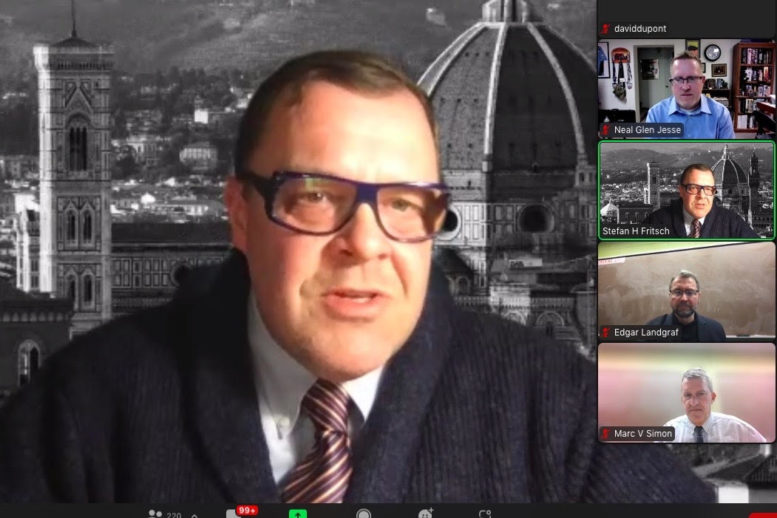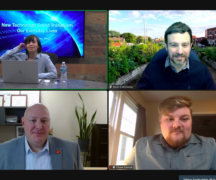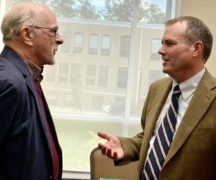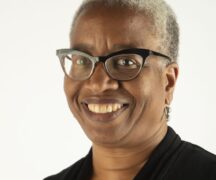By DAVID DUPONT
BG Independent News
Russian President Vladimir Putin underestimated the response to Russia’s invasion of Ukraine.
The reaction by the West has been “resolute and quick and united,” said Edgar Landgraf, the director of BGSU’s MA in European Studies.
That, Landgraf said, “indicates the level of concern in Europe about what’s going on and the fear of this just being the beginning of more expansionary politics.”
Landgraf was one of four faculty members on a panel organized and moderated by Marc Simon, chair of the Political Science Department, addressing the crisis. Others were: Neal Jesse, a professor of Political Science and author of the recent book, “Learning from Russia’s Recent Wars: Why, Where, and When Russia Might Strike Next” (Cambria press, 2020); Stefan Fritsch, an associate professor of Political Science whose research focuses on political economy, technology, and the politics of Europe; and Timothy Pogacar, an associate professor of Russian and an expert on the language, culture, and history of Russia and Slovenia.
(Click to view a recording of the panel discussion on Zoom.)
“Germans regret not having responded more forcefully to Putin earlier,” Landgraf said.
Now the Russians are being hit with a range of serious sanctions, including “the nuclear option,” removal from the SWIFT (Society for Worldwide Interbank Financial Telecommunication) international system which facilitates currency transfers, Fritsch said.
Western countries are also providing arms to the Ukraine’s military which has surprised the Russians with its resistance. Putin “expected his military to overrun Ukraine within about a week,” Jesse said.
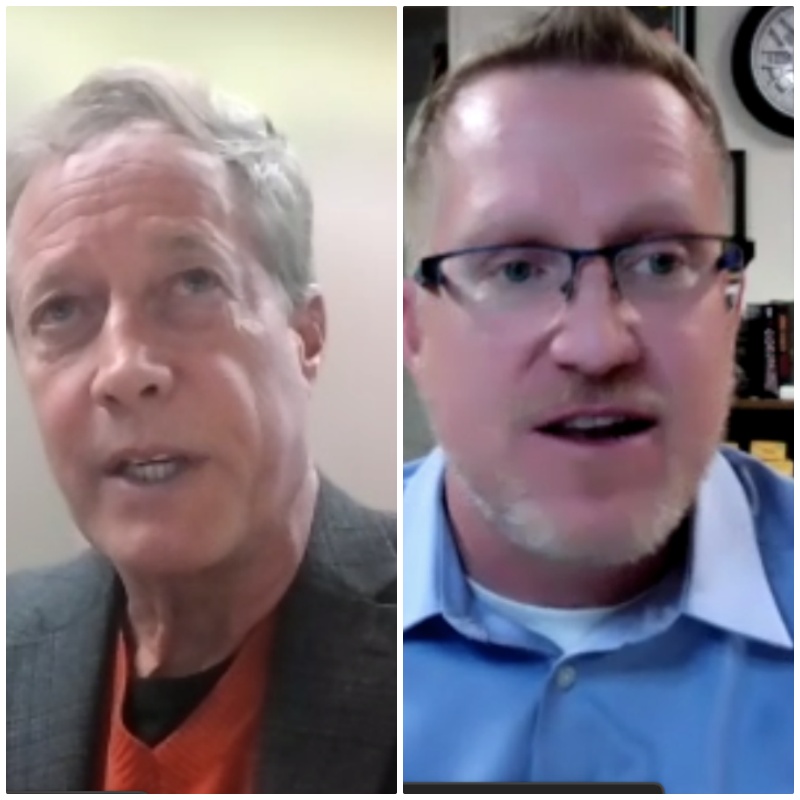
“This war has really been coming for quite some time,” he said. “Putin has been telling us since 2005 that he wants to dominate these countries and reestablish the Russian empire. … We should have been listening to him because he was telling us what he wanted to do, and while it may not make sense from a Western viewpoint for someone to seize Ukraine in this manner or try to seize Ukraine in this manner, from Putin’s viewpoint it continued to make sense … only now … he’s seen Western resolve.”
[RELATED: Russian propaganda laid groundwork for invasion of Ukraine & the impending humanitarian crisis, BGSU professor contends]
Jesse said that the invasion occurred now because Putin felt his military was finally up to the job.
Since 2014, when Russia took over Crimea and sided with separatists in the Donbas area, the Russians have been trying to upgrade their military, including relying more on volunteers than conscripts.
“We have these assessments of the Russian military as being exceptionally large and exceptionally capable and exceptionally efficient,” Jesse said. “The truth is they’re only one of those, and that is large. The Russian military is large, and it is modern, however, it’s not efficient.”
Putin had plenty of reasons to believe that the West would weakly respond. “Unfortunately, the West did not react very forcefully to the Russian invasion of Georgia in 2008 nor the Russian invasion of Ukraine of 2014,” Jesse said.
Sanctions were imposed. Fritsch said those have cost the Russia $50 billion a year since they were put in place. The Russian economy has grown a feeble 0.3 percent annually during that period when the annual global growth rate was 2.5 percent.
Despite that economic damage, those sanctions “didn’t fundamentally change their foreign policy,” Jesse said. “That’s what I meant by there wasn’t a robust response.”
The Russians continued to threaten their neighbors, assassinate opponents both at home and abroad, and destabilize democracies with misinformation and propaganda campaigns.
The Russian belief, which has been adopted by North American historians, is that Russian culture and state goes back more than millennium to Kievan Rus, a loose affiliation of princedoms, Pogacar said. “Taken to its extreme this view holds that Moscow is the sole rightful center of over 1000 years of East Slavic history.”
That’s the view Ivan the Terrible voiced in the 16th century, and that Putin has “vehemently put forth over the past year.”
The Ukrainians, however, see Kyiv as the cultural center.
The Russian Orthodox church has provided continuity over the millennium, and Putin has closely aligned himself with the church since 2021. But last year an independent Ukrainian patriarchy was established with the agreement with other Orthodox churches. This “was an affront to the Moscow patriarchy,” Pogacar said, because it questioned the historical narrative that Moscow was the center of the Orthodox faith among the Slavs.
“In many respects, since leaving the Soviet Union in 1991 Ukraine has undertaken a renewed nation building project like other Central and South Eastern European countries pursued in the 19th century,” Pogacar said. “This is largely a cultural project involving language, the arts, education, history. Ukrainian politics has been a muddle for the past 30 years and voters have been frustrated, but it doesn’t diminish their long-term support for the cultural part of the nation.”
Ukraine has not only grown distant from Russia culturally, but economically the country has moved closer to the European Union. In 2012, Fritsch noted, about 26 percent of its trade was with Russia and 25 percent with the EU. Less than a decade later, 40 percent of trade is with the EU and only 7 percent with Russia.
From 2013, Russia’s gross national product has been cut in half from $3 trillion in US dollars to $1.4 trillion, Fritsch said. That’s slightly larger than the GDP of Spain.
“The public perception … is that Russia is an economic giant,” he said. “When you look at the naked numbers, the raw numbers, it isn’t, economically speaking, it is a middle power.”
All of that has played into Putin’s aggressive moves which now that include nuclear saber rattling.
“He overestimated his military” Jesse said, “but he also underestimated both of the resolve of the West, as well as the solidarity of the West, and because he’s frustrated he’s playing a game of poker with us right now. … He’s trying to push more chips in and see if the West will fold. He’s wrong. We’re not going to, but that’s his play right now. So when we think about the possibility of nuclear warfare, it’s still a good distance away.”
Simon said Putin has “talked about nuclear weapons use for several years now. It provokes people. It makes people scared. It’s a way of grabbing the media.” This is a way of appearing strong and powerful.
“But you don’t have to worry about nuclear war breaking out anytime soon,” Simon said. “We understand deterrence … all the countries with nuclear weapons understand this.”
Still Simon said, “there are 4000 nuclear weapons in the US and Russia. They can be launched anywhere in the world if things get out of hand, for some reason. That is something to worry about. We lived with it and the Cold War, and we’ll have to live with some more.”

